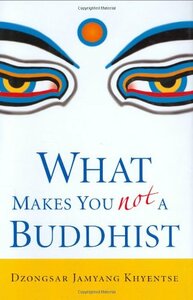Take a photo of a barcode or cover
Appreciated the straightforward approach. There were a few sentences or passages that were thought provoking. I feel like I understand Buddhism better and I'm interested in learning more.
3.5/5
Fairly provocative introduction to (Tibetan) Buddhism for westerners. The first Buddhist book I've seen written by a Tibetan with so many pop-culture references. He almost leans on bullying us westerners into abandoning our wrong views.
I think there are better proper introductions to Buddhism, but this one works well as a shake up for those caught up in the confusion of what Buddhism is, what it is not, and how its teachings can be applied to our lives.
Fairly provocative introduction to (Tibetan) Buddhism for westerners. The first Buddhist book I've seen written by a Tibetan with so many pop-culture references. He almost leans on bullying us westerners into abandoning our wrong views.
I think there are better proper introductions to Buddhism, but this one works well as a shake up for those caught up in the confusion of what Buddhism is, what it is not, and how its teachings can be applied to our lives.
challenging
informative
reflective
medium-paced
A very good intro for buddhism concepts, philosophy and practices. Enjoyable read, pretty simply written.
"Entertaining" feels like the wrong word for this book but compared to other books about Buddhism I've read I am compelled to call it that. It's not a sufficient explanation of the concepts but a refreshing and relatively easy read that frames what modern wellness distilled into mindfulness and awareness (and vegetarians).
Fair enough, I can see why some readers find the tone somewhat arrogant or insensitive here or there. On the other hand, I also started to understand that a lot of things people do (especially in the Western world) must look weird or unreasonable to someone who is extensively trained on the path.
Fair enough, I can see why some readers find the tone somewhat arrogant or insensitive here or there. On the other hand, I also started to understand that a lot of things people do (especially in the Western world) must look weird or unreasonable to someone who is extensively trained on the path.
Buddhism teaches us the four noble truths: All things are impermanent, all emotions are pain, all things have no inherent existence, Nirvana is beyond concepts. This book does a good job of elaborating on them, and why if you really understand this, you don't call yourself by a label. This is an accessible and no-nonsense introduction which does a good job of explaining where Buddhism comes from and what it is about. It, like Buddhism itself, doesn't try to convert you or tell you that it is the one and only religion. Instead, through humour and real world examples geared towards a Western audience, the author explains and encourages critical thinking.
This is half the common "Buddhism for beginners" (like there are so many, much better books) and half ramblings about what the author dislikes about the (western) world.
I could have done with less judgment and patronising, and I didn't appreciate the repeated remarks against democracy. This really put me off.
If you want to learn about Buddhist teachings, I would rather recommend Walpola Rahula's
"What the Buddha Taught" or "What Buddhists Believe" by K. Sri Dhammananda any day.
I could have done with less judgment and patronising, and I didn't appreciate the repeated remarks against democracy. This really put me off.
If you want to learn about Buddhist teachings, I would rather recommend Walpola Rahula's
"What the Buddha Taught" or "What Buddhists Believe" by K. Sri Dhammananda any day.
Rather dated with its references to GWB, Saddam Hussein, and Usama bin Laden - all of which fell flat anyway - but still well worth the swift read. Well-trodden ground for people with a basic understanding in the four major areas, nevertheless deftly presented and explained. Quite happy to have read it.
This was a very plainly written explanation of the four noble truths of Buddhism. It's written in a way that is very accessible to Western people, with examples that make sense (or at least made sense to me).
I'm still thinking about what the book said, so don't have a good review to give right now. If you are interested in an easy access point for the foundations of Buddhism, this is a good place to start.
I'm still thinking about what the book said, so don't have a good review to give right now. If you are interested in an easy access point for the foundations of Buddhism, this is a good place to start.
O carte foarte simpatica, care explica cat se poate de simplu si pe scurt principiile budismului si aplicarea lui in viata.
Cele patru sigilii:
toate fenomenele compuse sunt efemere
toate emotiile provoaca suferinta
nimic nu are existenta inerenta
nirvana e dincolo de orice concept
Cele patru sigilii:
toate fenomenele compuse sunt efemere
toate emotiile provoaca suferinta
nimic nu are existenta inerenta
nirvana e dincolo de orice concept




